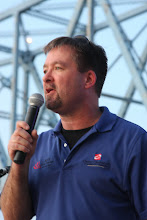 "I can't get in to see the right person at ______ to talk with them about doing business." I've heard that comment dozens of times from local small business managers as they try to make a sale to purchasing decision-makers at local larger businesses/industry/organizations. Hopefully, we at the Greater Owensboro Chamber of Commerce put a small but mighty dent in that plight last Thursday with the first "Owensboro Buys It!" expo.
"I can't get in to see the right person at ______ to talk with them about doing business." I've heard that comment dozens of times from local small business managers as they try to make a sale to purchasing decision-makers at local larger businesses/industry/organizations. Hopefully, we at the Greater Owensboro Chamber of Commerce put a small but mighty dent in that plight last Thursday with the first "Owensboro Buys It!" expo.An offshoot of the six-year-old "Owensboro Has It!" buy-local campaign, this event started early last summer when more than 100 small business Chamber members learned how to build their own two-minute "elevator pitch." They were then required to attend at least two Chamber focused-networking events to practice their pitch. About 80 businesses qualified to attend Thursday's expo and meet in five-minute, one-on-one meetings with purchasing personnel from nearly 30 large local businesses/industries/organizations that agreed to participate.
From most accounts, the small businesses appreciated the opportunity and many told me after their meetings that they expected to gain business from it. While that was music to my ears, comments I heard from the purchasers were more telling. "This went better than I expected," "I guess I didn't realize what we had here," "Next year we're going to bring more people," was what I heard. Put another way, many large companies with purchasing power to help local small businesses simply don't know what's under their nose. It's not just companies; many residents fall into the same category.
As the chamber of commerce guy, that fact of life makes me frown. Why do many people not look locally when they need a box of paper clips or an electrical contractor or a guitar? I realize this isn't just an Owensboro issue, but I do believe it's prevalent here. For those of you do think local when you buy, thank you. For those of you who don't, remember the plight of the small local business.



